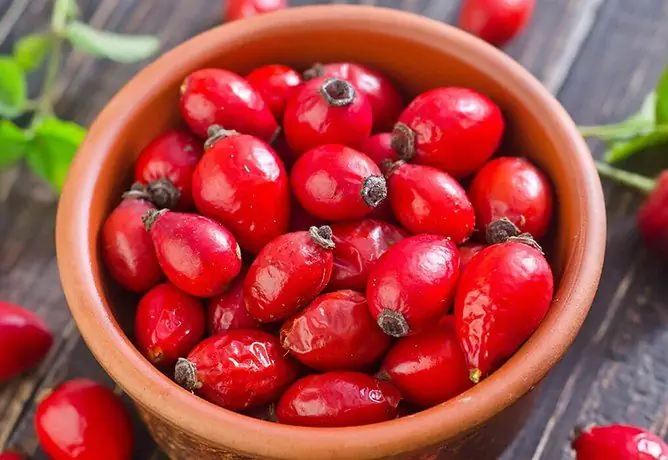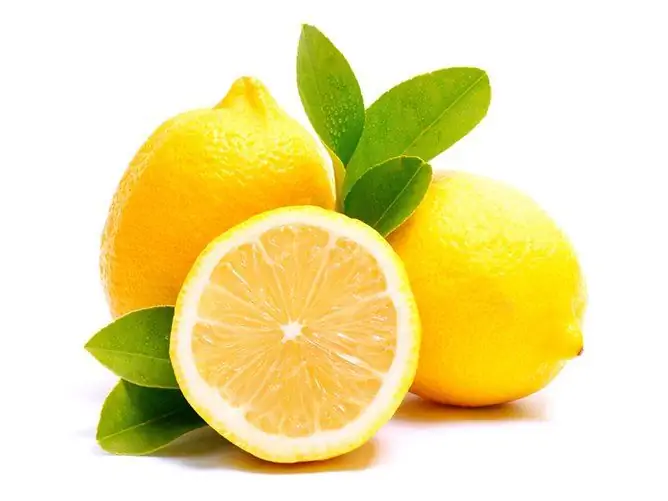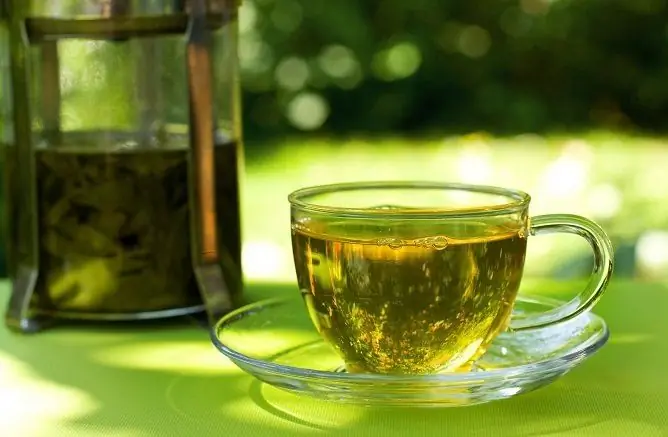- Author Rachel Wainwright wainwright@abchealthonline.com.
- Public 2023-12-15 07:39.
- Last modified 2025-11-02 20:14.
Does the dog rose increase blood pressure or lower it?
The content of the article:
- How does rosehip affect blood pressure?
- The healing properties of rose hips
- Rosehip Pressure Relief Recipes
- Indications and contraindications for the use of rosehip products
- Video
The influence of rose hips on pressure is ambiguous - in some cases it increases it, and in some it decreases it. In addition to regulating this important indicator, rosehip has a lot of useful properties, which makes it one of the most popular medicinal plants not only in folk but also in traditional medicine. Because of the pleasant taste of the fruit, tea and rosehip infusion are liked by people who are healthy and who suffer from various diseases, including hypertension. How useful is this tool for them?
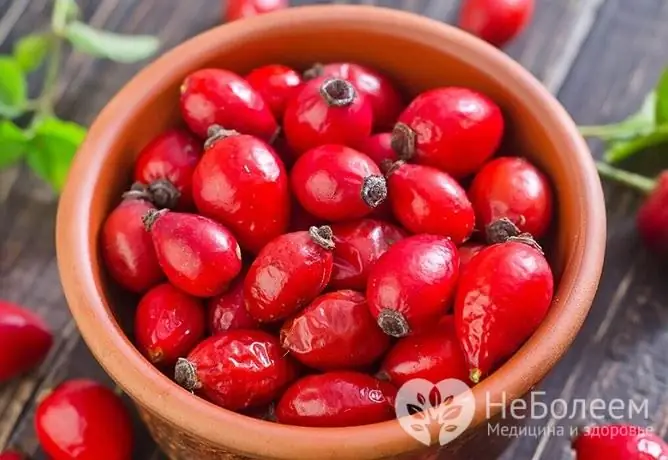
Rosehip fruits have many medicinal properties, making them one of the most popular medicinal plants.
How does rosehip affect blood pressure?
Rosehip helps to increase the rheological (flowing) properties of blood, cleanses blood vessels, strengthens the vascular wall - all this improves the state of the circulatory system and has a normalizing effect on pressure. This means that the low blood pressure (BP) of the dog rose can slightly increase, and the high blood pressure can decrease to normal values. Some of the diuretic effect that rose hips have can be used to lower blood pressure in a person with hypertension.
It is believed that different drugs from rosehip act on blood pressure in different ways. So, you can often find the statement that rosehip lowers blood pressure if taken in the form of water decoctions and infusions. Alcoholic rosehip tincture increases blood pressure, and syrup helps both at low pressure and at high pressure, that is, it has a regulating effect. In fact, there is no scientific confirmation of this, and all the products made from the fruits of this plant help to normalize blood pressure. This property makes rosehip a universal drug and allows it to be recommended for both hypo- and hypertensive patients.
The only exception can be, perhaps, alcohol tincture - not all people are shown alcohol-containing drugs, so it can be taken only after a positive doctor's answer is received.
The healing properties of rose hips
Rosehip fruits contain B vitamins (B 1, B 2, B 6), E, K, PP, iron, phosphorus, potassium, calcium, sodium, proteins, carbohydrates, essential oils, organic acids. In terms of vitamin C content, this plant surpasses lemons. Rosehip seeds are used to make oil that has anti-inflammatory and wound-healing effects.
The fruit of the plant helps to improve memory, enhance immunity, and also helps with headaches. Regular consumption of rosehip tea helps to normalize metabolism, improves blood, cleanses blood vessels from cholesterol deposits, and helps to strengthen the vascular wall.
Rosehip Pressure Relief Recipes
The following rosehip home remedies can be used to help normalize blood pressure after consulting your doctor.
It should be borne in mind that their reception cannot replace therapy with medications, if there is a need for it - herbal medicine can serve only as part of a comprehensive treatment. However, the regular use of the described drugs can be an effective prevention of blood pressure disorders in people predisposed to such pathologies.
Rosehip decoction. Grind two tablespoons of dry or fresh fruits, pour a liter of hot water, put on a low heat, let it boil and cook for 15 minutes. When the broth has cooled, strain. Take 0.5-1 glass 3-4 times a day 30 minutes before meals.
Rosehip infusion. Place two tablespoons of dry berries in a thermos, pour 0.5 liters of boiling water, leave for 4 hours. At high pressure, take half a glass before meals, in other cases it can be used as a substitute for regular tea, drinking one or two cups. If desired, you can add honey or raisins to the drink (the latter is added to a thermos before pouring boiling water).
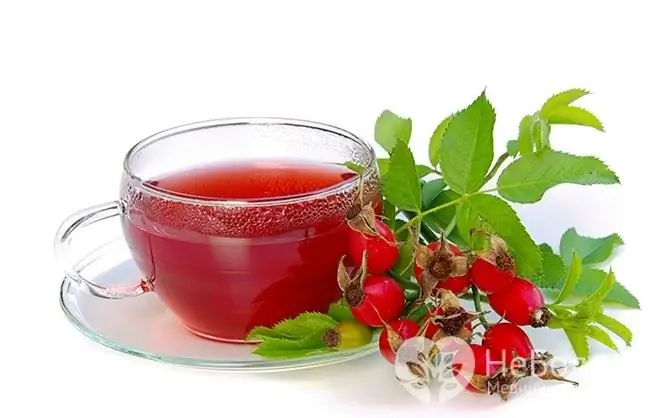
Rosehip infusion or tea helps to normalize blood pressure and strengthen the body
To normalize blood pressure, you can take a decoction of rosehip roots, and this remedy is also considered useful for kidney stones. Pour a tablespoon of dry crushed root with three glasses of water, bring to a boil, allow to cool, then bring to a boil again. After that, pour the broth together with the roots into a thermos and leave for three hours. Take in warm form, 0.5 cups 2-3 times a day.
A decoction of high blood pressure from wild rose, hawthorn, cranberry and chokeberry. Mix two tablespoons of fresh hawthorn and rose hips and one tablespoon of cranberries and rowan berries, pour 0.5 liters of hot water (80-85 ° C, not boiling water!), Leave for 2-3 hours. Take 100-150 ml 3 times a day half an hour before meals.
Rosehip tincture to tone up. 5 tablespoons of rose hips pour 0.5 liters of vodka or alcohol and leave in a dark place for 10-14 days, then filter. Take 20-30 drops before meals 3 times a day.
A decoction of rose hips and sage to increase blood pressure in case of hypotension. Take a tablespoon of wild rose and sage, pour a glass of boiling water, leave for 2-3 hours, strain. Drink a teaspoon several times a day (no more than 8 times).
Indications and contraindications for the use of rosehip products
Rosehip is effective not only for deviations in blood pressure, but also for vitamin deficiencies in the diet, as a choleretic and diuretic, as well as for the following pathologies:
- ARI and other infectious diseases;
- obesity and other metabolic disorders;
- inflammatory diseases of the urinary tract.
Contraindications to the use of rosehip-based products are:
- hyperacid gastritis;
- peptic ulcer of the stomach and duodenum;
- disorders of the motility of the gastrointestinal tract;
- liver disease;
- blood clotting disorders.
Long-term use of strong decoctions and rosehip infusions can lead to the destruction of tooth enamel due to the large amount of acids contained in the plant, therefore it is recommended to drink them through a straw, and then rinse your mouth with water.
Video
We offer for viewing a video on the topic of the article.

Anna Aksenova Medical journalist About the author
Education: 2004-2007 "First Kiev Medical College" specialty "Laboratory Diagnostics".
Found a mistake in the text? Select it and press Ctrl + Enter.

